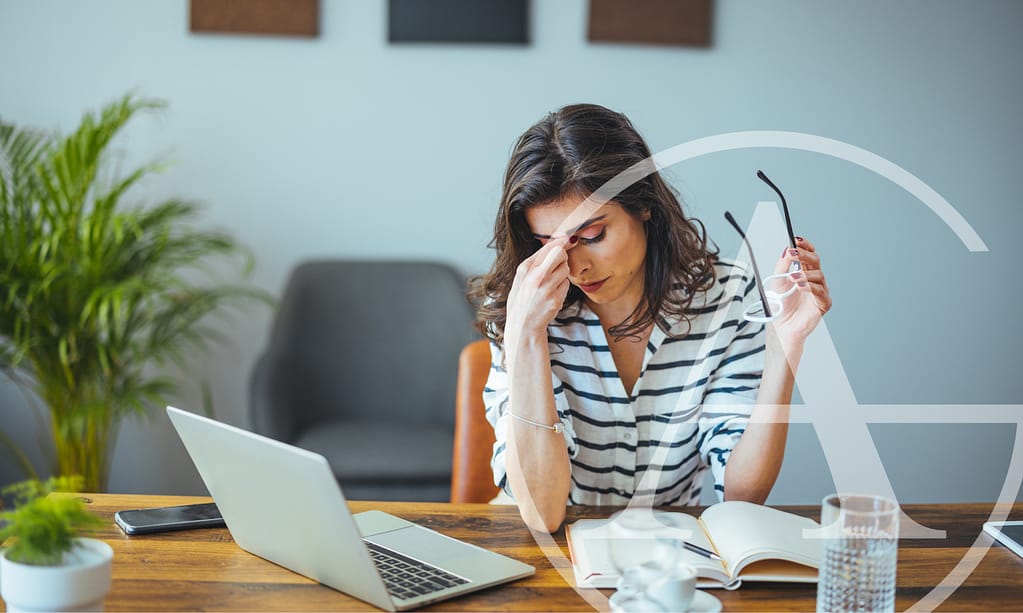Worn Out All Day? 5 Warning Signs That Sleep Apnea May Be the Culprit

If you’ve found yourself searching for “how to stop snoring” or facing fatigue throughout the day, you could be suffering from sleep apnea. This common condition can cause a wide range of issues without the patient even realizing they have it. Keep an eye out for these symptoms and make an appointment with a general dentist to find out more.
How sleep apnea impacts your daily life.
What is sleep apnea? It’s when you briefly stop breathing during sleep, jolting awake suddenly in response. There are two different types of this condition. Central sleep apnea is a complex issue that affects the nerve signals responsible for breathing. Obstructive sleep apnea is more common and caused by relaxing throat muscles, closing the airway.
You could develop obstructive sleep apnea due to a wide range of factors. Excess weight, a naturally narrow airway, age, alcohol and tobacco use, and family history can all play a part. In any case, you face a variety of risks if you don’t seek treatment.
People with sleep apnea are often tired throughout the day due to a lack of quality sleep. Why do people snore? This sleep condition is one of the top causes. It also leads to dry mouth, where low saliva production can increase your risk of tooth decay and gum disease. It can even increase your blood pressure, causing a wide range of issues.
Sleep apnea symptoms to watch out for.
The most important thing to know about sleep apnea is that you can’t take action until you know you have it. Most people simply write-off feeling tired as a consequence of some minor illness, or even a natural part of aging. Others focus on snoring remedies instead of treating the root cause of the problem.
If you notice any of these symptoms, you should bring them up at your next dental appointment. Your dentist can let you know the next steps for diagnosis and treatment.
1. Loud and Persistent Snoring
Sleep apnea is closely correlated with snoring. As the airway begins to close, your breathing becomes more forceful. The same amount of air needs to pass through a smaller space, so it’s moving faster.
That faster air causes tissue in your throat to vibrate, creating a distinct snoring sound. Keep in mind that sleep apnea isn’t the only cause of snoring. However, persistent snoring is a strong indicator.
2. Daytime Fatigue and Sleepiness
Sleep apnea causes you to jolt awake suddenly at night when your breathing is restricted. You may fall asleep right after, not even remembering it. However, it still affects the quality of your sleep.
Waking up multiple times throughout the night means you aren’t moving through sleep cycles properly, and you’re likely missing out on deep sleep altogether. This can leave you tired throughout the day—possibly dangerously, if you have to drive or operate machinery.
3. Gasping or Choking During Sleep
Most people don’t recall their sleep apnea episodes. However, you don’t necessarily fall asleep right away every time. You may have some memories of waking up gasping, choking, or coughing.
Your partner or others in your household might notice this, even if you don’t. If they say they hear you gasping at night, then consider finding out if this condition could be to blame.
4. Morning Headaches and Dry Throat
Morning headaches are another common symptom of sleep apnea. It isn’t exactly clear why that is—some professionals point to low blood oxygen levels, and others highlight the common coincidence of temporomandibular and other jaw issues. In any case, frequent morning headaches can indicate sleep apnea.
A dry mouth and throat are also signs of sleep apnea. People with this condition often breathe through their mouths during sleep. This can leave the mouth and throat dry upon waking. Saliva is an important factor in tooth decay prevention, so this condition can also impact your oral health.
5. Mood Changes and Irritability
Sleep apnea takes a mental and emotional toll as well. The lack of quality sleep can quickly lead to irritability and mood changes. If you find yourself becoming stressed, anxious, or irritated throughout the day, it could be due to this condition.
Don’t hesitate, take action on sleep apnea treatment today.
Do any of these symptoms sound familiar? They’re all good reasons to look into sleep apnea more closely. You can bring up the issue with your Park Cities dentist, and they can refer you to a sleep doctor to perform the necessary testing and diagnosis.
If this condition is the culprit, then Dallas Cosmetic Dental can provide treatment options such as a custom PX3 mouth guard. This comfortable oral appliance can avoid the need for a CPAP machine in mild-to-moderate cases. Schedule a consultation today if you’re concerned about the possibility of sleep apnea, or if you already have a diagnosis.